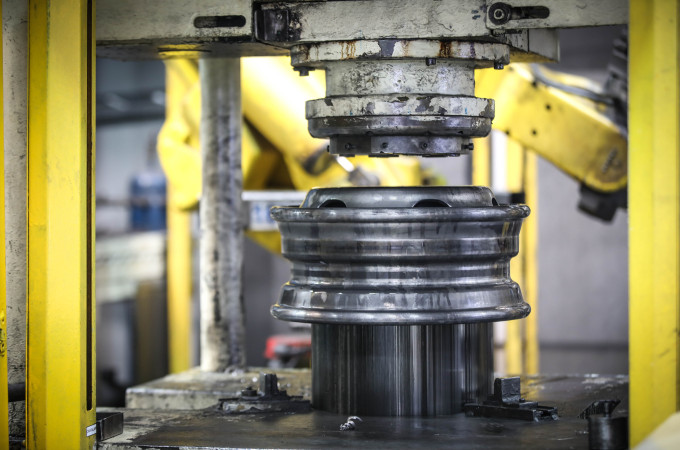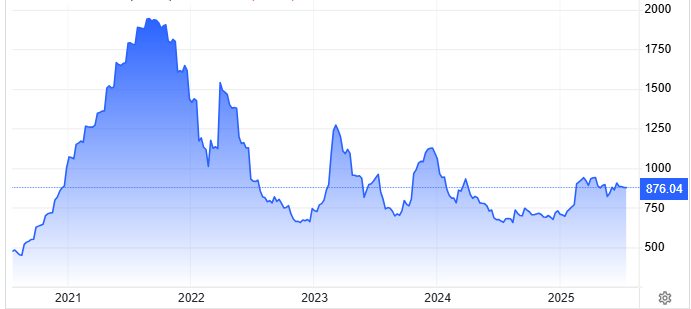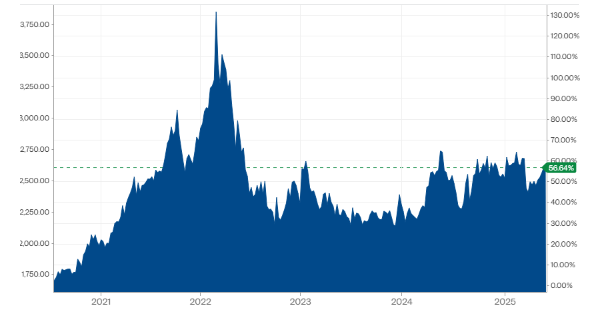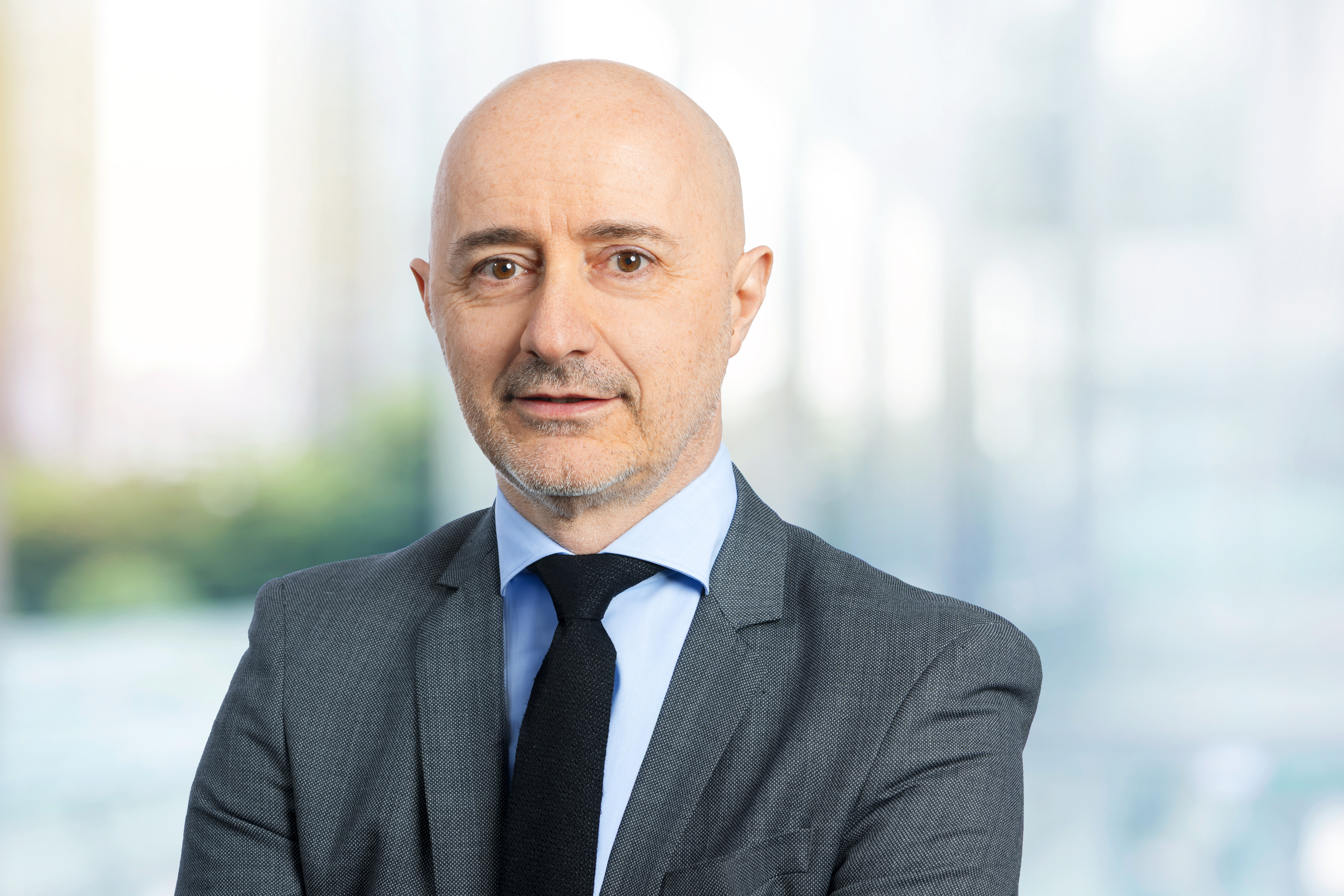Industry bellwether: T&BB discusses results and outlook for 2025 with Maxion’s CCO Giorgio Mariani
By Bradley Osborne - 2nd September 2025

Steel CV wheel production at Maxion plant
Germany – In Truck & Bus Builder’s “Global Truck Report 2007”, published just before the financial crisis and “great recession” of 2008, we claimed that “across the developed markets, the demand for trucks can often be seen as a leading indicator to inflexions in the overall economic cycle.” Whether or not the truck industry can really be taken as a bellwether of the global economy, the truck wheel, a commodity that exhibits inelastic demand – no commercial vehicle can run without wheels – is undoubtedly a reliable indicator of market trends within the industry. Maxion Wheels, which currently produces steel wheels for heavy commercial vehicles and steel and aluminium wheels for cars and light commercial vehicles, certainly believes in the predictive power of its truck wheel sales. “Usually, when we see shifts – positive or negative – on the truck side, they serve as an early indicator of what’s to come in the market,” said Giorgio Mariani, chief commercial officer at Maxion Wheels and vice president of global purchasing at parent company Iochpe-Maxion. “A good example is when, immediately post-COVID, it was the truck segment which began the industry recovery.”
Speaking with T&BB, Mariani made some intriguing predictions, based on the company’s first quarter results for this year and its second quarter figures (not yet released). South America, a particularly buoyant market for the commercial vehicle industry last year, is potentially due for a downturn, whereas Europe is likely to see the opposite, with commercial vehicle sales going up after a weak 2024. However, Mariani’s assessment of global market conditions does not account for the unpredictable consequences of U.S. tariffs, which may derail even the most cautious industry forecasts. “We think we are in a better position than other wheel manufacturers,” Mariani said about the impact of tariffs, “because of our global footprint.” Maxion Wheels has long been a “local-for-local” company, with only a few exceptions where it exports from one market into another. The manufacturer’s main concern is not about its global business but what the tariffs may do to demand within the North American market.
The question of what impact the tariffs are likely to have is a complicated one. Mariani told T&BB that the company assembled a “war team” to assess the impacts on its North American business and to decide on a response using its global resources. Maxion produces its truck wheels for the North American market mainly out of San Luis Potosí in Mexico, making it vulnerable to any restrictions imposed on products crossing the border into the USA. Mariani said that the company is already preparing to comply with the requirements of the United States-Mexico-Canada Agreement (USMCA), should they become more stringent in the future. However, he admitted that there is only so much that Maxion can do on its own:
The fact is that, in the U.S., there may not be enough raw material to meet industry-wide demand. To help ensure sufficient supply across the sector, sourcing metal from neighbouring countries such as Mexico or Canada is a must to ensure there is sufficient capacity for all manufacturers.
The tariff situation remains volatile, and we discussed the subject in full awareness that whatever we said could be rendered obsolete in a matter of weeks or even days.
As the outlook for the global economy becomes increasingly uncertain, Maxion Wheels leans more and more on its reputation as a stable and reliable supplier to the industry. The commercial vehicle manufacturers, Mariani claims, are conservative and traditional, and see Maxion as a dependable partner in difficult times: “we are reliable, we are flexible, and we bring state-of-the-art technology to every solution.” It helps that Maxion itself is a “conservative” company, according to Mariani, sticking rigorously to high standards of compliance and quality control and never chasing after business purely for the sake of business. “We may even have lost some volume in the last year,” Mariani told T&BB,
because we do not go after ‘no-matter-what’ business […] We always want to do things in a compliant way, in a profitable way, and I think, in the long run, the market is supporting this approach as we are gaining a lot of market share.
In an environment in which new names quickly pop up and disappear without trace, Maxion is sticking firmly to its principles and guarding its longstanding reputation.
Aside from product quality and customer satisfaction, one crucial way in which Maxion maintains its standing on the market is through careful management of its supply chain. As chief commercial officer, one of Mariani’s responsibilities is purchasing, particularly of steel and aluminium, which together make up more than 75% of the company’s procurement.
The worst thing you can do [as a supplier] is to miss a delivery date, whether that’s because you did not order the right amount of raw materials or because your supplier did not deliver them on time.
Keeping the company’s factories supplied with steel and aluminium is one of Mariani’s most important day-to-day tasks, and it requires a good deal of long-term planning as well as flexibility when things go wrong.
In the following analysis of the markets in which Maxion participates, I have reproduced figures taken from the full-year 2024 and Q1 2025 results published by parent company Iochpe-Maxion, which provide sales revenues by region. It is worth noting, however, that company turnover is not a perfect guide to market performance. “Always consider the impact of raw material prices,” Mariani said. Taking aluminium as an example, the price of one ton immediately following the COVID-19 pandemic was $1,500; today, the price is approximately $2,700, according to Mariani. By making the same number of wheels in 2021 as in 2025, Maxion could increase its annual turnover by several percentage points, simply because of the rise in raw material price. As useful as the numbers are on their own, they gain much more explanatory power when paired with Mariani’s commentary.

Development of the Steel Price Index, 2021-2025; Source: HRC Steel - Price - Chart - Historical Data - News
Market results and developments by region
In 2024, Iochpe-Maxion achieved net revenues of BRL15.3bn, an increase of 2.5% on the year before. These include sales from the structural components business as well as from Maxion Wheels: altogether, the wheels accounted for three-quarters of the group’s revenues. In 2024, steel CV wheels represented a fifth of the group turnover. In the first quarter of 2025, Iochpe-Maxion made BRL3.9bn, a 9.5% improvement over the same period of the year before. Again, steel CV wheels made up a fifth of the overall turnover.
In the regional breakdown, Iochpe-Maxion splits its statistics between “light vehicles” and “commercial vehicles”. The latter includes sales from the structural components business, primarily in the Americas. In South America, the group’s turnover increased by 10.5% to BRL4.4bn in 2024. Its net operating revenue in the fourth quarter was BRL1.12bn, representing 28.5% of the group’s consolidated revenues. The commercial vehicle business developed considerably by +26.9%. According to the company’s own estimates, 45,000 commercial vehicles were produced in the fourth quarter of 2024 in Brazil alone, a 48.6% increase on the year before (30,000).
In Q1 2025, the group’s net operating revenue increased by 6.7% to BRL1.04bn; however, the commercial vehicle business dipped very slightly by 1.8%. 39,000 commercial vehicles were produced in that quarter, an 8.6% improvement on the year before (36,000).
On the surface, the figures look good, but Mariani told T&BB that the company is now observing a softening in market demand that is expected to become more apparent as the year progresses. “We do see the numbers going down – nothing dramatic, but definitely not as good as we were hoping to see in the rest of 2025,” Mariani said. In Brazil, for example, the recent increase in interest rates to 15% is dampening demand for commercial vehicles, which are typically financed through bank loans. This has led many customers to adopt a “wait-and-see” approach rather than committing to new purchases. “Although some markets are showing signs of reduced production, Maxion is outpacing the industry,” said Mariani.
While our performance in Brazil mirrors the broader market, in other regions Maxion is gaining market share thanks to its solid quality and service, consistently outpacing industry trends.
Europe presents the opposite picture to South America. In 2024, Iochpe-Maxion’s revenue fell 4.3% to BRL5bn. In the fourth quarter, its net operating revenue increased by 10.9% to BRL1.36bn, indicating a reversal in the market, although the commercial vehicle business declined by 5.9%. In Q4 2024, the company estimates that 110,000 commercial vehicles were produced in Europe (+ Turkey), a 29.3% drop from the year before (155,000). Europe is Iochpe-Maxion’s most important market, representing around 35% of its consolidated revenues.
In Q1 2025, Iochpe-Maxion’s European business developed very positively, growing 18.6% to BRL1.48bn. The commercial vehicle business grew by 14.9% in the same period. 114,000 commercial vehicles were produced in Q1 2025, still short by 12.5% of the amount produced the year before (130,000).
“The second half of 2024 was weak [for Europe] as OE and trailer manufacturers adjusted their production downward,” Mariani told T&BB. He said that OEM order books have seen double digit declines in sales due to a stagnant economy and ongoing uncertainty. However, the company has observed encouraging signs of recovery since the beginning of this year. “The recovery is underway,” said Mariani. “It’s steady—and that’s what the industry needs right now.” This European recovery is taking place within a shifting competitive landscape, marked by a noticeable reduction in the number of steel truck wheel producers over the last five years. Difficult economic conditions often provide opportunities for success, and in Mariani’s evaluation, Maxion is emerging from the downturn stronger than before.
In Asia,1 Iochpe-Maxion reported a 5.2% drop in revenues in 2024, down to BRL1.4bn. In the fourth quarter, its net operating revenue increased by just 0.3% to BRL354m, although its commercial vehicle sales grew by 9.2% in the same period. In the first quarter of 2025, its net operating revenue jumped by 11.9% to BRL351m, while its commercial vehicle business continued to grow by 8.7%. Asia is the group’s smallest market in terms of sales, representing less than 10% of its consolidated revenues.
For Maxion Wheels, the two primary markets in Asia are China and India. In China, market conditions have been “okay”. Maxion’s market strategy is to position itself as a premium supplier, including to the European manufacturers who operate in the country. “We bring lightweight, high-quality wheels and a premium service that otherwise cannot be found amongst the many steel wheel producers in China,” said Mariani. The installed capacity of Maxion’s factory in Nantong is relatively low, standing between 500,000 and 750,000 wheels in total compared to several millions for its competitors. It is a market characterised by “overcapacity”, according to Mariani, and in such conditions, Maxion’s approach is not to compete on price, but to stand out through consistent delivery of high-quality products.
India is a “very strong” market, investing more in infrastructure than most other countries in the world right now, according to Mariani. “We are really taking advantage of the situation,” he told T&BB. “Our plant in India is well utilized and ready to scale as demand continues to grow.” As in China, Maxion is considered to be a premium supplier bringing “global” wheel expertise to the Indian market. According to Iochpe-Maxion’s estimates, however, commercial vehicle production in India is falling, with a 15.8% reduction in Q4 2024 (118,000 to 100,000) and a 4% reduction in Q1 2025 (130,000 to 124,000).
Finally, in North America, Iochpe-Maxion generated revenues of BRL4.6bn in 2024, a 6.1% increase on the year before. Its net operating revenue in the fourth quarter was BRL1.08bn, a 7.6% increase, and its commercial vehicle business grew by 4.2%. In the first quarter of 2025, its revenues grew more modestly by 0.8% to BRL1.07bn, while its commercial vehicle business declined by 5.3% in the same period. The company estimates that in Q4 2024, commercial vehicle production fell from 154,000 to 130,000 year-on-year (-15.6%) and from 162,000 to 126,000 in Q1 2025 (-22.2%). A large part of the increase in Iochpe-Maxion’s commercial vehicle business in 2024 can be attributed to the structural components business, not Maxion Wheels.
According to Mariani, the North American market regularly follows a cycle where, for two or three years, sales rise steadily before dropping quite substantially. At the current moment, the dampening demand for new trucks is driven largely by a huge inventory which Mariani estimates is as much as 50% above the normal level: “This is, of course, slowing down a lot of purchasing.” However, the tariffs imposed by the new administration are also impacting the market. “The tariffs are creating a lot of uncertainty because everybody expects they will bring some extra cost to the final user,” Mariani told T&BB. In the truck segment, Mariani expects the impact will be felt more strongly in Class 8 due to reduced imports, lower goods transportation, and declining consumer confidence. However, Maxion Wheels, which primarily serves classes 4-7, is less exposed to this trend, as the North American Class 8 market is largely dominated by forged aluminium wheels.
1 In Iochpe-Maxion’s figures, “Asia” also includes South Africa.

Development of the Aluminium Price Index, 2021-2025; Source: Aluminium PRICE Today | Aluminium Spot Price Chart | Live Price of Aluminium per Ounce | Markets Insider
Supply chain and sustainability
Although U.S. tariffs have been under the spotlight recently, Mariani noted that protectionism is rising globally, making cross-border automotive exports increasingly challenging. In Brazil, for example, importing wheels from another country is almost “mission impossible”, according to Mariani, “due to regulatory and logistical barriers.” While Maxion’s core model is “local-for-local” production and sales, the company has built a flexible manufacturing footprint to support OEMs and ensure business continuity. “Depending on demand, we can tool products in different locations,” Mariani said. The Turkish operations in Manisa, for instance, support European production with full interchangeability. Later this year, Maxion will begin producing forged aluminium CV wheels in Turkey: a strategic expansion that completes its product offering for existing customers and opens access to a previously untapped market segment.
As for the supply of raw materials, the picture is different depending on the metal. The aluminium industry is truly global and far more open than the steel industry, where there are more protections in the forms of tariffs and quotas. Nevertheless, there are circumstances, for example, where the price of steel in Asia versus that in Europe may incentivise the company to import more Asian steel for its European production. In such cases, it is necessary that the quality of the imported steel be matched to that of the domestic steel so that product quality does not suffer as a result.
Whatever we produce, whether it is German, U.S., or Chinese steel, the specifications are one-hundred-per-cent the same, no matter what, and the approval process is the same,
Mariani told T&BB. Normally, Maxion will only import raw materials from a known supplier, i.e., a source which is already supplying to another of Maxion’s plants. To continue the example above, Maxion’s European plant may select a supplier in Asia which has already undergone the approval process to supply Maxion’s Asian plants; following selection, the supplier will go through the same process again to ensure that it matches up to the Maxion specification. The approval of a new supplier can take several months.
It is only through such rigorous procedures that Maxion can maintain its reputation as a solid and dependable partner to the commercial vehicle industry. Mariani is proud that the company has made it through the past five years unscathed, in spite of several dramatic interruptions to the global supply chain including COVID and the blockage of the Suez canal in 2021. “At Maxion, we expect our suppliers to operate in a socially and environmentally responsible manner,” Mariani said.
This includes meeting specific certifications and undergoing regular audits to ensure compliance with our standards – whether it’s reducing carbon emissions, managing water usage responsibly, or adhering to strict ethical and labour practices. These expectations reflect our broader commitment to sustainability and integrity across the entire value chain.
Maxion requires its suppliers to complete regular self-assessment audits and encourages them to join associations such as Responsible Steel and the Aluminium Stewardship Initiative. These are some of the qualities that make Maxion a “resilient” supplier of wheels, in Mariani’s opinion.
Alongside resilience, there is the subject of supply chain sustainability, and while Maxion maintains the same standard of quality across its global production network, the demand for sustainable products varies widely from market to market. Mariani said that the “biggest push” towards sustainability at the moment is coming from Maxion’s European customers.
In the last few years, we have been increasing the availability of greener supplies of raw material, which means that today, if you were to request the greenest wheels possible in Europe, we are ready to provide you with them,
Mariani told T&BB. This demand, however, is coming primarily from the light vehicle segments and not from commercial vehicle. “So far, commercial vehicle customers have not yet really defined specific targets—such as requiring a certain percentage of green steel by a set year,” Mariani said. The problem, put simply, is cost: or, more precisely, the broader market’s readiness to invest in greener materials. Maxion says it is committed to developing with affordability in mind, making sustainability accessible rather than exclusive. As Mariani put it:
Sustainability must be scalable and affordable—our job is to make sure our customers don’t have to choose between doing the right thing and staying competitive.

Giorgio Mariani serves as chief commercial officer of Maxion Wheels, a position he has held since January 2024. Before that, he held leadership roles in sales, business development, and supply chain at the company over a span of thirty years. In April 2025, Mariani also took up the post of vice president of global purchasing for parent company Iochpe-Maxion.

